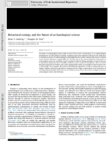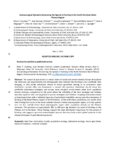1 - 25 of 9
| Creator | Title | Description | Subject | Date | ||
|---|---|---|---|---|---|---|
| 1 |
 |
Rogers, Alan R.; Jorde, Lynn B. | Founder effect: assessment of variation in genetic contributions among founders | We present a Monte Carlo method for determining the distribution of founders' genetic contributions to descendant cohorts. The simulation of genes through known pedigrees generates the probability distributions of contributed genes in recent cohorts of descendants, their means, and their variances. | 1994 | |
| 2 |
 |
Codding, Brian F. | External impacts on internal dynamics: Effects of paleoclimatic and demographic variability on acorn exploitation along the Central California coast | Research into human-environment interaction in California prehistory often focuses on either the internal dynamics of adaptive decisions or the external impacts of environmental change. While both processes were surely driving prehistoric variability, integrating these approaches is not altogether s... | Acorn exploitation; Prehistoric land use; Behavioral ecology | 2016 |
| 3 |
 |
Rogers, Alan R.; Jorde, Lynn B. | Genetic structure of the Utah Mormons: comparison of results based on RFLPs, blood groups, migration matrices, isonymy, and pedigrees | The genetic structure of the Utah Mormon population is examined using 25 blood group and 47 RFLP alleles obtained from 442 subjects living in 8 geographic subdivisions. Nei's Gst was 0.013 (p < 0.002) for the RFLP data and 0.012 (p > 0.4) for the blood group data, showing that only 1% of the geneti... | 1994 | |
| 4 |
 |
Codding, Brian F. | A land of work: foraging behavior and ecology | Work is a core theme in many of the major issues and debates in California archaeology. Work is central in understanding why the first Californians entered the region (e.g., Erlandson, this volume): how thousands of years of work following colonization resulted in the overexploitation of particular ... | Human behavioral ecology; Hunter-gatherer; North America: California | 2012-03-15 |
| 5 |
 |
Codding, Brian | Behavioral ecology and the future of archaeological science | The future of archaeological science relies as much (if not more) on theoretical as on methodological developments. As with anything in biology, explaining past human behavior will require the application of evolutionary theory. As with anything in archaeology, theory is useless without clear ties t... | 2015-01-01 | |
| 6 |
 |
Codding, Brian | Alternative aboriginal economies: Martu livelihoods in the 21st century | In the western deserts of Australia, hunting and gathering endures as an important social and economic activity. That foraging persists within the boundaries of developed industrialized nation states may come as a surprise to those who evaluate foraging as less profitable than agricultural, wage or ... | Aboriginal economics; Aboriginal foraging | 2015 |
| 7 |
 |
Codding, Brian F. | Socioecological dynamics structuring the spread of farming in the North American Basin-Plateau Region | The spread of agriculture is a major driver of social and environmental change throughout 25 the Holocene, yet experimental and ethnographic data indicate that farming is less profitable than foraging, so why would individuals choose to adopt agriculture leading to its expansion? Ideal distribution ... | Ideal free distribution model; population ecology; behavioral ecology; maize agriculture; Ancestral Puebloan; Fremont Complex | 2021 |
| 8 |
 |
Codding, Brian F. | Interpreting abundance indices: some zooarchaeological implications of Martu foraging | Indices of taxonomic abundance are commonly used by zooarchaeologists to examine resource inten sification, overexploitation and gender divisions in foraging labor. The original formulation of abundance indices developed a clear interpretive framework by linking the measure with foraging models from... | Human behavioral ecology; Zooarchaeology; Ethnoarchaeology; Resource intensification; Gender division of labor; Western Australia | 2010-07-20 |
| 9 |
 |
Wiessner, Pauline W. | On emergency decisions, egalitarianism, and group selection | Boehm (CA 37:763-93) puts forward an important thesis-that with the evolution of egalitarian societies, privileged routes to reproductive advantage are blocked and the power of individua selection severely compromised. With competition so constrained, altruistic behavior can more readily spread i... | Boehm's mode; Evolution of altruistic behavior | 1998-06 |
1 - 25 of 9
